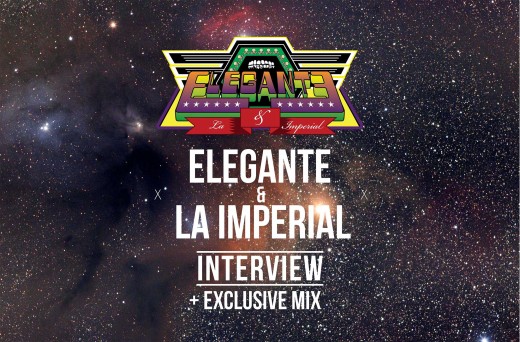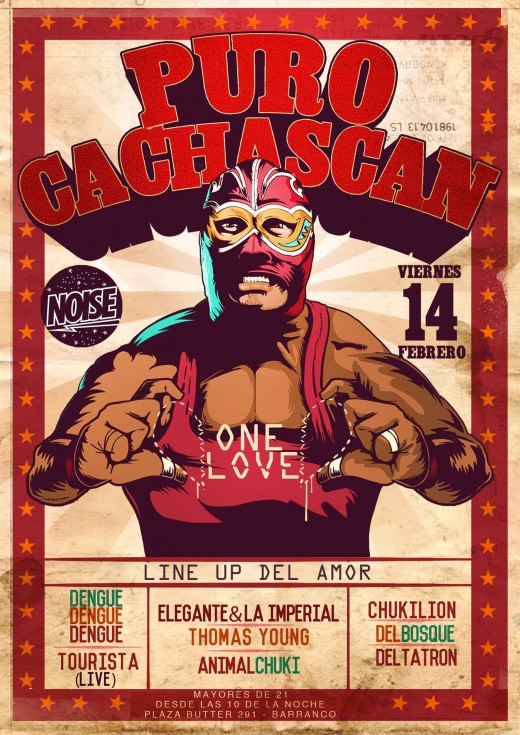In Latin America, there are a lot of talents that we want to make you discover at Couvre x Chefs. One of them is called Elegante & La Imperial and comes from Lima, Peru. Under this pseudonym, which will be explained in the following interview, Daniel Martinetti is a producer and DJ who built his career as he built his music: assembling his house music background with his tropical roots. On the occasion of the release of his first album “El Sonido de Las Lobas” I was able to ask a series of questions to Elegante & La Imperial to learn more about his musical career. He even made us an exclusive Couvre x Tape that you can listen to right here:
One of the tropical bass pioneers in Peru
Couvre x Chefs: Hi Daniel! Your colleagues Dengue Dengue Dengue at Auxiliar records told me that you were one of the initiators of the current Lima “tropical bass”, and that you were one of the first to experiment with mixing native rhythms (cumbia, chicha etc …) with electronic music. How did you start and how did you get this idea? An event or a particular artist inspired you?
Elegante & La Imperial: Well, if we talk about merging styles of electronic music with native rhythms, we can say that yes I was one of initiators. Since the late 90s, when I was 14, I may have been one of the first in the circle of producers of electronic music in Peru to have the desire to mix genres. We must say we had very little to do with electronic music at the time.
I live in a city that is a fusion of a lot of influences, so I think the fact of wanting to mix our culture with indigenous rhythms from other parts of the world came naturally. It also comes from the fact that when I first became involved in electronic music, I started as a DJ mixing house music with a classical configuration: two turntables and a mixer. But since I do not have much house music vinyls, as I was using the records of my uncles and grandfathers, I found myself doing sets that included house but also rock, Afro-Peruvian music, Creole waltz and even classical music. I used all the records I had. It allowed me to work the synchronization between tracks. Then when I started to produce music, that is when I discovered that there were programs to create music (Mboom, Fast Tracker, Impulse Tracker), in 1998. At that time when I learned how to sample, I needed to have the music on CD or on wave format to easily load into a computer. I had no internet and I had very little music CDs because I always used a lot of tape, so I used the CD that was in my grandfather´s house. That’s how I discovered other creole waltz, Peruvian music in general and classical music. I sampled sources that I found, which belonged to other artists to start composing. At that time the music I produced was more like IDM and my first edits or official remixes were those of songs like “Toromata”, “Cuando llora mi guitarrra” or “Regresa” which are true anthems of the Peruvian waltz and the Afro-Peruvian music.
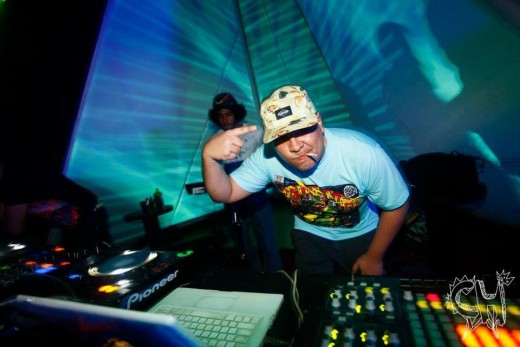
In 2010 I had the idea of merging dubstep with lando (Afro-Peruvian rhythms), using samples taken from a vinyl called Chabuca Granda. That’s how I composed two songs (“Lundu Lando” and “Malambo”) in a form that I called Afrostep. It was at that point that I wanted to operate a turning point in what I was doing and concentrate on what I had been doing all these years without realizing it: fusion equality. So I changed my nickname from Elegante (I sometimes write 31364n73) to Elegante Y La Imperial. The idea comes from trucks traveling through Peru loaded with goods: they all have slogans on the back. I found the Imperial and elegant could be a slogan written on the back of one of those trucks and when I listen to my music that is exactly what I imagine: being in a truck while enjoying the scenery on the highway listening to Peruvian music.
CxC: Do you think it’s the natural evolution of Afro-Peruvian rhythms? Let me explain: gradually the computer is in the process of replacing everything around us, do you think that at some point it became inevitable that these genres such as cumbia, chica which had previously been played by groups with instruments have become electronic and computer based?
Elegante & La Imperial: I think yes. Besides this way helped many native rhythms of Peru to survive. Much of our music might have disappeared because only few people have managed to spread it when it appeared and I think today with the new generation of musicians including myself, we’re upgrading the local music scene. We can speak of a “strong” evolution of these rhythms because it seems to me that the electronic music enables an efficient fusion, which helps re-interpret our music digitally.
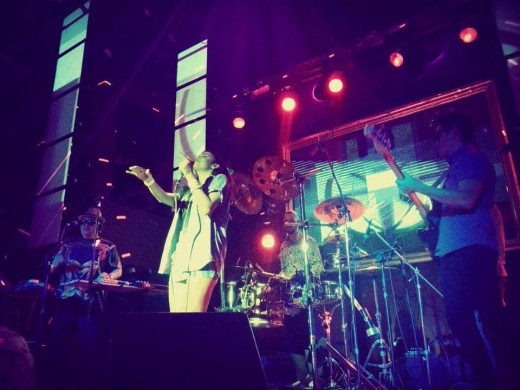
Elegante & La Imperial: from the DJ set to the complete live band
CxC: « Elegante & La Imperial » is your solo project, where, during your live, you are alone behind your computer and other machines. Now in the evenings you offer an alternative where you play with a full band on stage. Who makes up your group and what are the characteristics of these two concepts?
Elegante & La Imperial: When I changed the project name of “Elegante” to “Elegante & La Imperial” I thought that the next step was to form a group in order to reinterpret the themes that I produced in solo to traditional, ie with a real group that became known as “The Imperial”. When I finished my first album “El Sonido de Las Lobas” I decided that I wanted to play live with a band so I called some friends, whose work I admire and suggested that they join the project: the Imperial Y Elegante was going to have two sides, one is a live act with musicians on stage, and the other is a hybrid DJ set that includes a live set made only with machines and a DJ and where I literally play records for dancing. Besides the live rehearsing with the group is more like a ritual, you have to view it as a journey. The group consists of 4 people: Fefa Cox (vocals), Alejandro Leon (bass), Max (percussion) and myself.
With the band we have composed lyrics for the instrumental songs, and we will include these new versions on a forthcoming republication of “El Sonido de Las Lobas”. We are also working on the next record. It will be a combination of compositions clearly electronic and other with voice and instruments.
CxC: Why did you want to change your project into a real band?
Elegante & La Imperial: I always wanted to give more life to my songs and I feel that by playing with live instruments I give them an organic touch.
A night out in Lima : “TOMA !” or “Puro Cachascan”?
CxC: I know that you are part of the line-up of TOMA! Lima, with Dengue Dengue Dengue, Animal Chuki, Qechuaboi … but you also play in the events “Puro Cachascan” that you organize. What is the concept? And especially for us Europeans … what does that mean “Puro Cachascan”?
Elegante & La Imperial: Right, it’s me who organizes the “Puro Cachascan” evenings. The name comes from a type of show that comes from Mexico: “lucha libre” (Author’s note: the famous Mexican wrestling masks and with a good dose of spectacle, inevitable during your next visit to the kingdom tacos) but in Peru we call it “cachascan”. The idea of “puro cachascan” is to make events at which, not masked wrestlers compete, but DJs! We invite DJs from different styles and scenes such as an indie band, tropical bass djs, house or drum’n’bass djs … and every artist has a set of one hour to convince and make people dance. It’s a bit of a mix of everything, as is my musical career: a mix of house, tropical bass, electroclash, IDM, techno … I wanted to make an evening with my own sauce and for the record, my track “Puro Comer” (Author’s note: the first single from the debut album of Elegante & La Imperial) begins with a sample that says “purocachascan, purocachascan …” So the circle is complete.
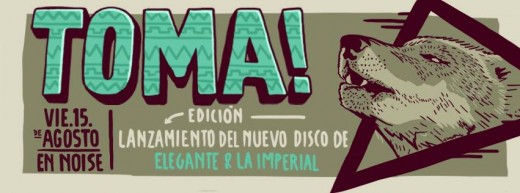
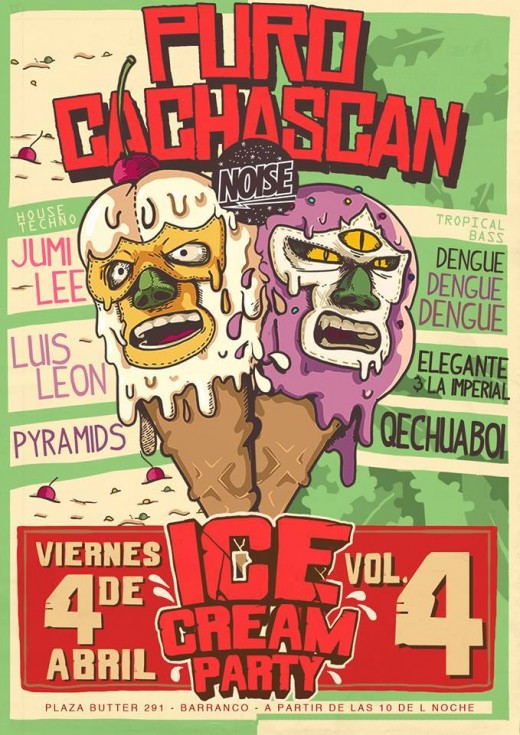
CxC: At the beginning, your project was called simply “Elegante” what difference are there between “Elegante” and “Elegante & La Imperial” ?
Elegante & La Imperial: Like I said earlier, when I started with the Elegante name or 31364n73, I experienced with more abstract IDM music or minimal … This project was active between 2000 and 2008. I then took a break to do some research and I came back as Elegante & La Imperial. At that moment I knew that what I wanted to do was merging the native rhythms of Peru and Latin America with contemporary electronic music rhythms.
CxC: I have listened to your album, released by Terror Negro (available here), I have found a lot of mashups. Experiment with mashups allowed you to better define the style you wanted with Elegante Y La Imperial?
Elegante & La Imperial: Yes totally. At that time my music was influenced by tropical Dengue Dengue Dengue and Frikstailers (Author’s note: Argentine group signed to the label ZZK Records) which made a lot of mashups and I wanted to try this myself but with my personal touch. I think what I mixed the first time was deep house with cumbia. What I was mixing at the time, I called, “deep cumbia.” there were tracks by Art Department, Seth Troxler or slow down and mixed them with cumbia. This way of mashups has also influenced the way I produce. It happened naturally and as, also, a producer of deep house, we had to just let the paths meet.
“El Sonido de Las Lobas”, first album of Elegante Y La Imperial released by Auxiliar
CxC: You just released your album “El Sonido de Las Lobas” (available here) on Auxiliar, the label of Dengue Dengue Dengue, is your first album of tropical bass? You felt it was the right time in your musical career to get it out?
Elegante & La Imperial: Yes this is my first tropical bass album. It is a record that I finished composing in 2012 but I think the two years waiting before the release are not felt, the record is still very cool!
CxC: What changes now with that record in your discography?
Elegante & La Imperial: As I told you, this album was ready since late 2012 but it took some time before being released. I wanted it to come out on Auxiliar, the label of my friends los chicos Dengue Dengue Dengue, because it was important to me that my first album is released by a Peruvian label. Auxiliar just started as a label, that’s why I waited to publish this record but it was worth it. Now my current sound is a continuation of El Sonido Las Lobas. I hope to have a new album finished by March 2015.
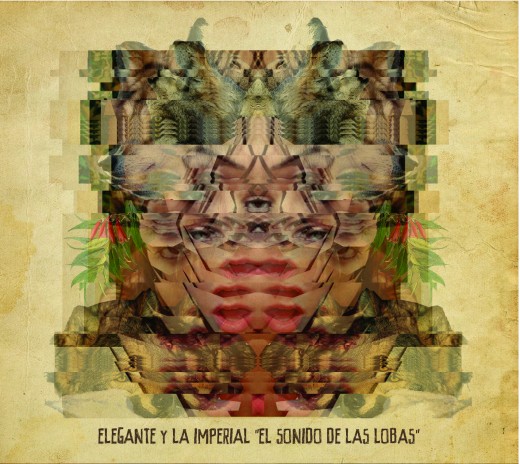
CxC : Why did you choose Auxiliar for your album?
Elegante & La Imperial : Because Auxiliar has supported me a lot, in the sense that they started the tropical bass movement in Peru almost alone and they created the events that are the heart of this movement. They always invited me as a guest, so when they got the idea to start their own label, it was immediately agreed upon that my first record will come out on their label, and that’s what happened.
The record´s artwork is produced by Yerko Zlatar, a local artist and friend. Auxiliar are responsible for all physical and digital distribution.
CxC: You still use very specific names to define the styles of your compositions: afrostep, dumbia, digital chicha, marinera bass or more generally tropical bass … is it a way to identify the various native rhythms with which you work?
Elegante & La Imperial: Yes, it’s a way of labelling my sound experiments when they begin to give something. For example afrostep is the fusion of landó with dubstep. I think it’s a very rich variation and I will continue to experiment … and I would be delighted if others are experimenting too! The marinera bass is a style that I continue to work with, although the tempo and rhythms of “marinera” are a bit more complex. I have a clear idea of what I want to do. The chicha is a style I have always loved and that has always been in my subconscious through the work of “Chacalon Y La Nueva Crema Grupo” group, whom I love. The guitar sound they have, is what I try to imitate with my keyboards.
CxC: In “El Sonido de Las Lobas” you used a lot of cumbia rhythms; this is the style that inspired you the most?
Elegante & La Imperial: Yes there are many rhythms in this record. Rhythms of cumbia villera (Author’s note: own style to Argentina) and more traditional cumbia of Peru mixed with deep house pads and distortion laden melodies, which are emulations of guitars from chicha.
I love the rhythm of cumbia as you can dance to it or listen to it quietly. It is hypnotic.
Elegante & La Imperial vs. Danny eM
CxC: You’re also director of your own school of electronic music: WARP. Can you describe this project?
Elegante & La Imperial: WARP, which the name refers to a function in Ableton Live software, is a space where I organize dedicated sessions for creating music in workshops, using electronic means. I teach electronic music production, but also DJing, while trying to develop the electronic culture by sharing my experience. Lately, I feel as though the technology that greatly facilitates the act of producing and mixing is becoming the factor that some forget the roots of electronic music … that is what I like to emphasize in my classes. I also invite musician friends to perform demonstrations and I am looking constantly for local talents to let them get scholarships and help them grow.
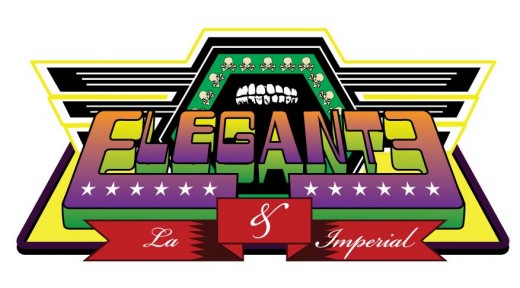
CxC: Elegante & La Imperial is your fusion project of electronic music and Afro-Peruvian music but apart from that, you also produced in different registers as house, under the name of Danny eM. That brings a duality? Is it important for you to keep both projects at the same time?
Elegante & La Imperial: Exactly. As I told you, I started as a DJ and my firsts vinyls of electronic music were house music. That’s how my love for this music was born. In the beginning I was only mixing house and was producing IDM and other experimental music. Since the break I took from my initial project “Elegante” in 2008-2009, I started really producing house, electro and techno.
In 2010, I started “Elegante & La Imperial” but my career as a house DJ had already started so I found myself with these two sides and I’m doing fine until today.
For me I feel the need to create and mix house and techno as much as creating and mixing tropical bass. It gives me pleasure, it really overwhelms me. Some days I’m more house and other days more tropical hahaha.
CxC: How did you discover electronic music? Is it popular in Peru or were you forced to search in specific and dedicated shops, clubs or places ?
Elegante & La Imperial: Thanks to my older brother who went to raves around 1996, I heard for the first time of groups like The Prodigy, Chemical Brothers, The Orb, Orbital Atari Teenage Riot … but also mixtapes of local DJs, at the time, as Hugo Boccio. In 1998, I saw the Beastie Boys perform on the MTV Music Awards. This is where I saw Mix Master Mike for the first time and I was fascinated by the DJ who created music with vinyl records and a mixer. At the time, I knew nothing about the hardware. Later that same year, I saw an advertisement in The Source (Author’s note: Magazine North American rap) for kits for amateur DJs … so I understood what I needed exactly. I started to put money aside to buy my firsts turntables and my mixing desk. At first I wanted to learn to scratch but as the rave scene was booming in Peru, it was toward it that I turned. Another important event was when my brother went to live in Argentina: he sent me my firsts house records. It was a blend of Chicago house, New York, UK Garage …
CxC : What are your favorite artists and your references to electronic music?
Elegante & La Imperial: In no particular order, the DJ’s and producers that always influenced me: Aphex Twin, James Blake, Danny Tenaglia, DJ Sneak, Autechre, Takeshi Muto and discs Schematic Music company (my friends would collect discs IDM when I was a teenager and they remain for me a great reference as of today), Dj Koze, Vitalic, Miss Kittin & The Hacker, DJ Hell and Gigolo Records, Giorgio Moroder, Frankie Knuckles, Larry levan, Jean-Michel Jarre, Lee Foss, Seth Troxler, Armand Van Helden, Matthew Herbert, Señor Coconut, Daniel Bortz, Nicolas Jaar … a lot!
Locals: Dengue Dengue Dengue, Animal Chuki, Deaf Pillow DeltaTron, Chakruna, He Did, Luis Leon, Qechuaboi, Two’s Tones.
CxC: Do you remember how you started listening to Afro-Peruvian music? You grew up with chicha, the Lambo, cumbia etc?
Elegante & La Imperial: If you are Peruvian you listen to these native rhythms forever. At least my generation. Grandparents, rather listen to Peruvian waltz, Afro-Peruvian music and classic cumbia. Besides, I do not even listen to chicha as something traditional. For me, it is something I use to hear in the street. It is that sweet, tender music that I heard when I went to the market as kid. I did not even know what it was but those sounds remained in my heart and I started to rediscover them in my adulthood. I love the sound and atmosphere of the Peruvian chicha and the popular markets of the capital of my country.
CxC: What are your future plans after your album coming out?
Elegante & La Imperial: First there is a new single, then a second version of “El Sonido de Las Lobas” which will include some lyrics on the disc versions. I am also working on what will be my next album. In fact I usually compose music and see what follows after. I hope that my album “El Sonido de Las Lobas” will be heard outside of my country and go on tour with my band and / or my DJ formation .
CxC: Thank you for the time you took to answer our questions!
Elegante & La Imperial: Thank you for your interest, it touches me deeply. Big up from Lima, Peru!
